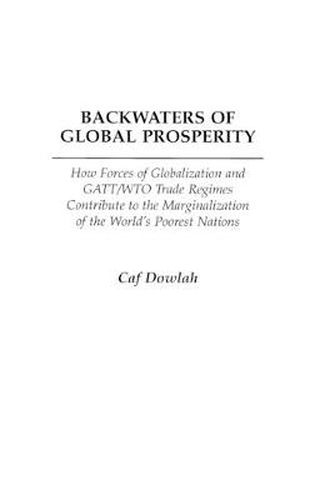Readings Newsletter
Become a Readings Member to make your shopping experience even easier.
Sign in or sign up for free!
You’re not far away from qualifying for FREE standard shipping within Australia
You’ve qualified for FREE standard shipping within Australia
The cart is loading…






Marginalization of the world’s poorest countries has been growing since the 1980s; this work gets to the heart of the issue by analysing all the factors involved From direct foreign investment to the flow of capital, there are endless factors that affect the economies of the world’s poorest countries. Knowledge of the struggles of these countries, also known as the Least Developed Countries (LDCs), is essential to understanding the impact of globalization. This work provides a platform for understanding why developed countries are reaping the benefits of globalization while the LDCs are being left behind. Topical chapters seek to uncover the processes that LDCs should take to reverse their marginalization and build their economies so that they can receive the benefits of globalization. Subjects include: The relationship between the World Trade Organization, World Bank, and the International Monetary Fund; multilateral trade regimes; tariff and non-tariff barriers in developed countries; global commodity prices; trends in poverty and human development; technology. Analyzes why globalization is failing to work for poorer nations Discusses the role of organizations such as the World Bank and IMF in marginalizing poor countries
$9.00 standard shipping within Australia
FREE standard shipping within Australia for orders over $100.00
Express & International shipping calculated at checkout
Marginalization of the world’s poorest countries has been growing since the 1980s; this work gets to the heart of the issue by analysing all the factors involved From direct foreign investment to the flow of capital, there are endless factors that affect the economies of the world’s poorest countries. Knowledge of the struggles of these countries, also known as the Least Developed Countries (LDCs), is essential to understanding the impact of globalization. This work provides a platform for understanding why developed countries are reaping the benefits of globalization while the LDCs are being left behind. Topical chapters seek to uncover the processes that LDCs should take to reverse their marginalization and build their economies so that they can receive the benefits of globalization. Subjects include: The relationship between the World Trade Organization, World Bank, and the International Monetary Fund; multilateral trade regimes; tariff and non-tariff barriers in developed countries; global commodity prices; trends in poverty and human development; technology. Analyzes why globalization is failing to work for poorer nations Discusses the role of organizations such as the World Bank and IMF in marginalizing poor countries